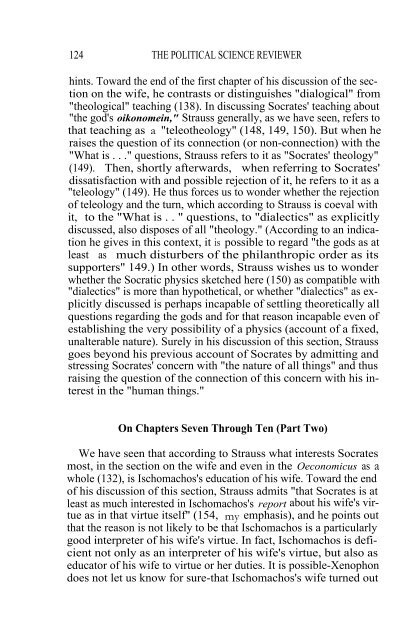Strauss on Xenophon's Socrates Xenophon's Socratic Discourse: An ...
Strauss on Xenophon's Socrates Xenophon's Socratic Discourse: An ...
Strauss on Xenophon's Socrates Xenophon's Socratic Discourse: An ...
Create successful ePaper yourself
Turn your PDF publications into a flip-book with our unique Google optimized e-Paper software.
124 THE POLITICAL SCIENCE REVIEWER<br />
hints. Toward the end of the first chapter of his discussi<strong>on</strong> of the secti<strong>on</strong><br />
<strong>on</strong> the wife, he c<strong>on</strong>trasts or distinguishes "dialogical" from<br />
"theological" teaching (138). In discussing <strong>Socrates</strong>' teaching about<br />
"the god's oik<strong>on</strong>omein," <str<strong>on</strong>g>Strauss</str<strong>on</strong>g> generally, as we have seen, refers to<br />
that teaching as a "teleotheology" (148, 149, 150). But when he<br />
raises the questi<strong>on</strong> of its c<strong>on</strong>necti<strong>on</strong> (or n<strong>on</strong>-c<strong>on</strong>necti<strong>on</strong>) with the<br />
"What is . . ." questi<strong>on</strong>s, <str<strong>on</strong>g>Strauss</str<strong>on</strong>g> refers to it as "<strong>Socrates</strong>' theology"<br />
(149). Then, shortly afterwards, when referring to <strong>Socrates</strong>'<br />
dissatisfacti<strong>on</strong> with and possible rejecti<strong>on</strong> of it, he refers to it as a<br />
"teleology" (149). He thus forces us to w<strong>on</strong>der whether the rejecti<strong>on</strong><br />
of teleology and the turn, which according to <str<strong>on</strong>g>Strauss</str<strong>on</strong>g> is coeval with<br />
it, to the "What is . . " questi<strong>on</strong>s, to "dialectics" as explicitly<br />
discussed, also disposes of all "theology." (According to an indicati<strong>on</strong><br />
he gives in this c<strong>on</strong>text, it is possible to regard "the gods as at<br />
least as much disturbers of the philanthropic order as its<br />
supporters" 149.) In other words, <str<strong>on</strong>g>Strauss</str<strong>on</strong>g> wishes us to w<strong>on</strong>der<br />
whether the <strong>Socratic</strong> physics sketched here (150) as compatible with<br />
"dialectics" is more than hypothetical, or whether "dialectics" as explicitly<br />
discussed is perhaps incapable of settling theoretically all<br />
questi<strong>on</strong>s regarding the gods and for that reas<strong>on</strong> incapable even of<br />
establishing the very possibility of a physics (account of a fixed,<br />
unalterable nature). Surely in his discussi<strong>on</strong> of this secti<strong>on</strong>, <str<strong>on</strong>g>Strauss</str<strong>on</strong>g><br />
goes bey<strong>on</strong>d his previous account of <strong>Socrates</strong> by admitting and<br />
stressing <strong>Socrates</strong>' c<strong>on</strong>cern with "the nature of all things" and thus<br />
raising the questi<strong>on</strong> of the c<strong>on</strong>necti<strong>on</strong> of this c<strong>on</strong>cern with his interest<br />
in the "human things."<br />
On Chapters Seven Through Ten (Part Two)<br />
We have seen that according to <str<strong>on</strong>g>Strauss</str<strong>on</strong>g> what interests <strong>Socrates</strong><br />
most, in the secti<strong>on</strong> <strong>on</strong> the wife and even in the Oec<strong>on</strong>omicus as a<br />
whole (132), is Ischomachos's educati<strong>on</strong> of his wife. Toward the end<br />
of his discussi<strong>on</strong> of this secti<strong>on</strong>, <str<strong>on</strong>g>Strauss</str<strong>on</strong>g> admits "that <strong>Socrates</strong> is at<br />
least as much interested in Ischomachos's report about his wife's virtue<br />
as in that virtue itself" (154, my emphasis), and he points out<br />
that the reas<strong>on</strong> is not likely to be that Ischomachos is a particularly<br />
good interpreter of his wife's virtue. In fact, Ischomachos is deficient<br />
not <strong>on</strong>ly as an interpreter of his wife's virtue, but also as<br />
educator of his wife to virtue or her duties. It is possible-Xenoph<strong>on</strong><br />
does not let us know for sure-that Ischomachos's wife turned out

















